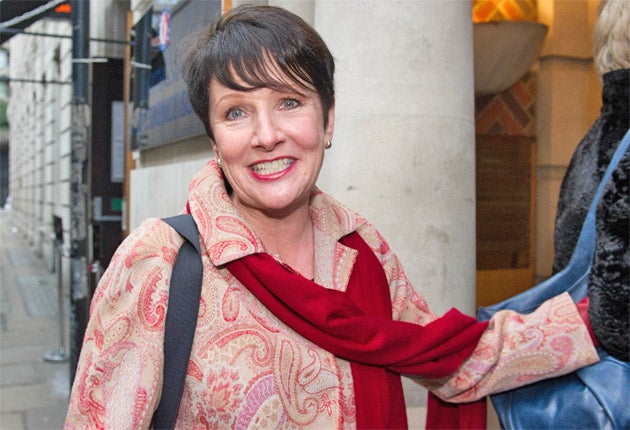BBC ageism verdict gives hope to older presenters
Miriam O'Reilly is set for a six-figure payout after losing her job on 'Countryfile' because her bosses thought she was too old

Miriam O'Reilly was looking pretty good as she gave a press conference to celebrate victory in her two-year battle with the BBC – but not good enough, it seems, for fastidious young people who might be inclined to tune into Countryfile on Sunday nights.
She was dropped after the BBC1 programme moved from its daytime slot, causing audience figures to treble from 1.8 million to 5.4 million, with the BBC claiming Ms O'Reilly was not well known enough for the larger, younger audience. But yesterday a tribunal ruled she had been a victim of age discrimination. She can now look forward to a six-figure payout and the prospect of more television work.
Ms O'Reilly's victory will give hope to other television presenters who feel they were pulled off the screen prematurely. When Moira Stuart was dropped from her Sunday morning slot on BBC 1 in 2007, at age 55, there were also accusations of age discrimination. In the same year, Anna Ford quit the BBC after 17 years, claiming nobody over 60 was employed as a newsreader.
Two years ago, 57-year-old Selina Scott won £250,000 from Channel Five after her contract offer was suddenly withdrawn and offered to two younger presenters. In July 2009, Arlene Phillips, 66, was dropped as a judge of Strictly Come Dancing in favour of 30-year-old Alesha Dixon, prompting Harriet Harman, who was then the equalities minister, to accuse the BBC of ageism.
Ms O'Reilly was one of four female presenters who were told late in 2008 that they were going to be dropped from Countryfile. Yesterday, after a 12-day hearing in November, the employment tribunal dismissed the argument that age was not a factor as John Craven, then 68, had been retained as the main presenter. The tribunal contrasted instead the ages of three "second-tier presenters" who were dropped – O'Reilly, then 51, Charlotte Smith, 44, and Juliet Morris, 43 – with the ages of their replacements: Jules Hudson, 38, Katie Knapman, 36, and James Wong, 26.
"We consider that a significant factor in their choice was their comparative youth and, in the decision not to consider the claimant, her age," the judgment said. "If the claimant had been 10 to 15 years younger, she would have been given proper consideration to remain as a presenter."
It continued: "We do not accept that it has been established that choosing younger presenters is required to appeal to such an audience. It is not a means of achieving that aim. Even if it was a means of achieving that aim, it would not be proportionate to do away with older presenters simply to pander to the assumed prejudice of some younger viewers."
During the evidence, Ms O'Reilly claimed that BBC producer Dean Jones had warned her: "You're going to have to be careful about those wrinkles when high definition comes in."
She added that Jones had referred to the arrival of high definition as "crunch time" for her 25-year BBC career – and that the warning had a "ring of truth" due to the "ageist attitude" of her employer. She said: "I also remember that in about March 2008, when I expressed my concern about visible signs of ageing affecting my career to director Louise Pyne, she said: 'It's time for Botox.'"
However, the tribunal dismissed Ms O'Reilly's claim of sex discrimination. BBC1 controller Jay Hunt, who has since moved to Channel 4, told the tribunal she was offended by the suggestion that she was biased against older women. "I am a 43-year-old woman and I have had my own difficulties surviving this industry. The last thing I would ever do is discriminate on the basis of gender or age," she said.
A BBC spokesman said yesterday the corporation "accepts the findings".
Michelle Mitchell, charity director at Age UK, said: "The outcome of this high-profile case sends out a powerful signal that even in the youth-worshipping world of showbusiness, age discrimination can be withstood."
Subscribe to Independent Premium to bookmark this article
Want to bookmark your favourite articles and stories to read or reference later? Start your Independent Premium subscription today.

Join our commenting forum
Join thought-provoking conversations, follow other Independent readers and see their replies